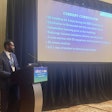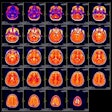
Ready or not, radiology residents and their educators are getting a crash course this year in virtual board exams due to the COVID-19 pandemic. And the exams may be around for a while, even as the pandemic recedes.
In 2021, the American Board of Radiology (ABR) started using software from proctoring firm Proctorio to administer its Core Exams for diagnostic radiology, interventional radiology, radiation oncology, and medical physics. Residents may take the exams at home or in a hospital office; their performance is recorded by webcam and reviewed later for scoring and to ensure candidates are not cheating.
The plan is to continue remote/virtual testing indefinitely, according to ABR Executive Director Dr. Brent Wagner. Prior to the pandemic, the Core Exams were held at two centers in Chicago and one smaller site in Tucson, and applicants needed to travel to these locations. This of course was not feasible during the pandemic, due to restraints on travel and limitations on gatherings of people.
The ABR considered other brick-and-mortar testing options, but it found that cancellations were common and that the testing sites were not predictable. Also, the ABR needs to be able to ensure image quality and ambient lighting for its Core Exams for diagnostic radiology and interventional radiology, Wagner explained.
The ABR set aside the first months of 2021 for those who were eligible in 2020, with the first exams held in February.
"We wanted to give a guaranteed date so they could prepare for the exam," Wagner said.
As of June 1, 4,816 candidates had been tested in 2021, which is similar to figures from the prepandemic years (see table).
| Number of test-takers per year for ABR and ARRT certification exams | ||||
| 2018 | 2019 | 2020 | 2021 (though June 1) | |
| ABR, number of examinees | 4,362 | 4,713 | 680 | 4,816 |
| ARRT, number examinees | 14,899 | 16,501 | 14,689 | N/A |
The ABR's decision to delay the 2020 exam had been controversial for a variety of reasons, creating challenges for family planning, negative effects on employment opportunities, and salary losses.
However, Wagner said that the remote exams went very smoothly, with minimal technological disruptions and favorable feedback about the remote platform overall from candidates. Candidates enjoyed avoiding the expense of traveling and taking days off to take a test in person, Wagner said.
While cheating has reportedly been a problem with online exams generally, it was not an issue for the ABR, he added. Wagner said that he is optimistic that the ABR will be able to continue with remote exams indefinitely, having made progress with bug fixes, and will be refining the experience for candidates with each administration.
"We feel we can administer an exam that is valid and credible to the public while allowing candidates to avoid the expense and stress of travel," Wagner said. "I hope it's a positive impact."
The virtual format has caused concerns among residents at Washington University's Mallinckrodt Institute of Radiology regarding computer and bandwidth issues causing snafus, according to Dr. Sanjeev Bhalla, section chief of cardiothoracic imaging. However, the university education program director worked with IT to create a space for residents to take the exam on campus that worked well, and residents wound up being happy to take the test remotely.
Virtual exam administration got a considerable boost in acceptance during the pandemic, said Jerry Reid, PhD, CEO of the American Registry of Radiologic Technologists (ARRT). Reid pointed out that in February, the National Commission for Certifying Agencies (NCCA), released a report concluding that remote proctoring may meet its standards "provided that implementation is thoughtfully executed."
"Importantly, as [live remote proctoring] is a relatively new delivery method for certification, continued research is needed," noted the NCCA, which is the voluntary accreditation arm of the Institute for Credentialing Excellence.
However, the ARRT has held most of its own certifying exams year-round on an on-demand basis in person at Pearson Vue testing centers, and it continued to do so during the pandemic. Candidates have three years after completing all of their education requirements to apply to take ARRT certifying exams.
Early in the pandemic, brick and mortar centers closed briefly but then they reopened for professionals deemed essential, which includes radiologic technologists, though the pandemic made it less convenient to sit for exams in terms of scheduling. Capacity was reduced due to social distancing requirements and varied depending on the state, but the hours of operation also expanded.
"Because of that flexibility, a lot of the impact of the pandemic was mitigated," Reid said.
Capacity is now back at 100%. Reid noted that while all certification exams are administered in person, the ARRT does offer continuing qualification assessments in a virtual as well as in-person format.
"Surprisingly, our experience is that most individuals still want to go to a brick-and-mortar test center," Reid said. "That has held true during the pandemic as well."
Reid explained that there are concerns of running into technical problems, and some people are not comfortable with being monitored at home by strangers. However, virtual administration of certifying exams could be in store for the future.
"I would never say never -- things are changing," Reid said. "We would certainly leave our mind open to that as a possibility."



















